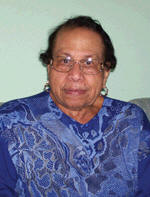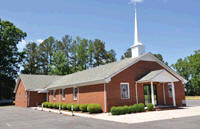|

Download in PDF Format
When most people hear the word “Yale,” they probably
think of the esteemed university in New Haven, Connecticut ... unless they
reside in southeastern Virginia.
Then, chances are they think of a small community located
a few miles south of Route 40 in Sussex County. If you drive along
Courthouse Road you will travel through Yale in a very few minutes. And you
may feel that you have not missed much by doing so, but you need to drive
slower and look deeper. Otherwise, you’ll likely miss the history, mystery
and mischief that are all part of Yale.

The community of Yale,
marked by long stretches of soybean and
peanut fields, is located along Courthouse
Road in Sussex County. |
The community of Yale is classified as a code “U6,” which
is “a populated place that is not a census-designated or incorporated place
having an official federally recognized name.” Indeed, the origin of the
community’s name itself is something of a mystery.
“I never really thought about it,” was Roger Kitchen’s
response when asked where the name came from. A phone call to his sister,
Adelaide Harrup, who is one of several keepers of the local history, yielded
the same answer. There would seem an obvious connection to Yale University
and an article written by a Yale student did assert the area was named by a
Yale graduate who was laying rail for the Southern Railway in the late
1800s, though no verification for the information was cited.
In driving the area, one sees more what used to be than
what is. “You can still see several of the six stores that were running at
one time,” according to Roger Kitchen, a lifelong resident of the area. “As
a young boy, I learned to cuss sitting outside one of the old stores at
night where the men would go to play cards.” The remaining store has become
more restaurant than store and is quite busy during hunting season. It is
also the only place in Yale to buy gas.

Magee's Store, now
closed, originally housed the Yale post
office. |
The Yale post office, zip code 23897, was originally in
one of the still standing, but closed, stores. Magee’s Store housed the post
office until 2004, when a new structure was built across the street. Mrs.
Dot Frye, another of the area historians, recounts that the first rural
postal route in Sussex County was run from the Yale post office by horse and
buggy. Mrs. Frye worked for the postal service for 35 years. The first
postmaster was Mr. Lowery, an African-American gentleman. Sadly, this post
office recently received word that its rural route will be moved to another
post office, leaving postal-box delivery the remaining delivery service.
Though the community’s most visible commerce now is
production of peanuts, soybeans, cotton, wheat, corn and other
agriculture-related activities, Yale once supported two stave mills, two
lumber mills, two cotton gins and a sawmill to harvest the abundant
surrounding forests. The rail line had a stop at Yale for freight, logging
and passengers.
“My mother came to Yale by train from Fredericksburg in
1920 to teach. She was paid $100 a month and $25 of that went to the
superintendent of schools, who offered room and board to several teachers at
the school,” shared Mr. Kitchen, who still has a letter his mother wrote
concerning her new position.
The “two-up, two-down”-style high school, built in 1917,
burned to the ground and wasn’t replaced. Local legend has it that the old
school bell was removed from the premises while it was still warm by a
couple of brothers using a child’s wagon.

Mrs. Fannie Key came
to Yale in 1942 to teach the area's
African-American children. |
About a mile from the post office is a one-room
schoolhouse that served grades 1-7 of the area’s African-American children.
Mrs. Fannie W. Key came from Powhatan in 1942 to teach those grades. She was
selected by Superintendent T. D. Foster as a result of a mass hiring that
occurred after some of the previous teachers had protested that black
teachers were not paid the same as the white teachers and were let go.
“I had 54 children in grades 1-7, all being taught in
that one room,” recalls Mrs. Key. “That was part of the ‘Equal but Separate
Educational Opportunities’ at that time. The children had to walk to
school and I remember it being so cold in the winter. We had a potbelly coal
stove in the center of the room and all of the children would sit in circles
around that stove. After a while, the ones closest to the stove would move
to the outer circle of chairs and the next row would move up to the stove.
We would do that all day to try to keep everybody warm.”
Mrs. Key found that part of the problem was the trap door
to the attic in the building was missing, so cold air was just blowing in
through the opening. “I looked around and saw George Washington hanging up
on the wall above the blackboard — like he was in all of the schools — and I
asked one of my taller boys to get that picture down. We nailed him up over
the trap door so instead of us looking up at him, he was looking down at us
and the room was a whole lot warmer after that.”
Mrs. Key retired from teaching after 47 years in other
elementary schools in Sussex County. All of those years of experience led
her to one primary observation: “Busy students don’t have time to get in
trouble.”
A Strong Religious Core
Aside from stores, farms, and forestry related
employment, Yale has also had a strong religious core through the years, an
influence that exists to this day. Antioch Baptist Church was founded on
June 13, 1772, with a total of 87 members. Originally known as Raccoon Swamp
Meeting House, the name changed in 1852 when Antioch became the mother
church of six congregations in four other counties in Virginia. Antioch
Baptist Church is the first Baptist church in Sussex County and one of the
earliest in Virginia.

Calvary Baptist Church
was erected in 1884 and was rebuilt in 1999. |
Two other churches are found along Courthouse Road.
Calvary Baptist Church was erected in 1884 and was rebuilt in 1999, and the
Seventh Day Adventist Church was organized in 1913 with the present building
erected in 1955.
Riding down the roads in Yale you will see names such as
Shanko, Zimmerman, Bonderanko, and Koliadko representing the Russian
population in the community. Mr. Dan Koliadko has resided in Yale all of his
life. His mother was born in Yale in 1901. His father had come to the United
States to make money, go back to Russia and enter the Greek Orthodox
priesthood. His parents met in a Russian class at a college in Chicago,
where the future Mrs. Koliadko took courses with her two brothers. Mr.
Koliadko tells of his father returning to Yale with one of the brothers to
farm. “He earned one dollar per week plus milk and eggs.”
Others found employment in mill work, farming, the
railroad or newly emerging manufacturing jobs. At that time, the Russian
community of Yale attended the Russian Baptist Church, where services were
conducted in Russian and English. Over time, beliefs and philosophies
changed from Russian Baptist to Seventh Day Adventist, which is active today
and includes a school for grades K-8.
The Yale of Today

Charlie Stephenson,
current manager of Camp Rudolph, grew up in
Chesapeake and attended the Christian
service camp as a youth. |
Despite its many old buildings and history, Yale is not a
village stuck in the past. The Joyner-Gray-Yale Ruritan club is very active
and held its 37th annual oyster roast in January. There is also a Tidewater
Christian Service Camp known as Camp Rudolph that hosts young campers during
the summer and also provides retreats for adults in the off-season. “I grew
up in Chesapeake, Va., and came to Camp Rudolph for a couple of summers,”
stated Charlie Stephenson, current manager of Camp Rudolph. “We had 536
campers come through in 2010 and are always looking for activities to add as
time and our budget allows.” Some newer offerings at the camp are a
zip-line, team-building course, and wholesome fresh produce for meals grown
by the Carr family next door.
If you find yourself traveling down Route 40, in
southeastern Virginia, turn south at Sussex Courthouse and follow Courthouse
Road to Yale for a glance back to yesterday. And be sure to look up Roger
Kitchen if you know where the name “Yale” came from.
|